Nvidia's Project G-Assist is the first AI assistant I actually can't wait to have running on my gaming PC
This is an AI that could make PC gaming more accessible than ever.
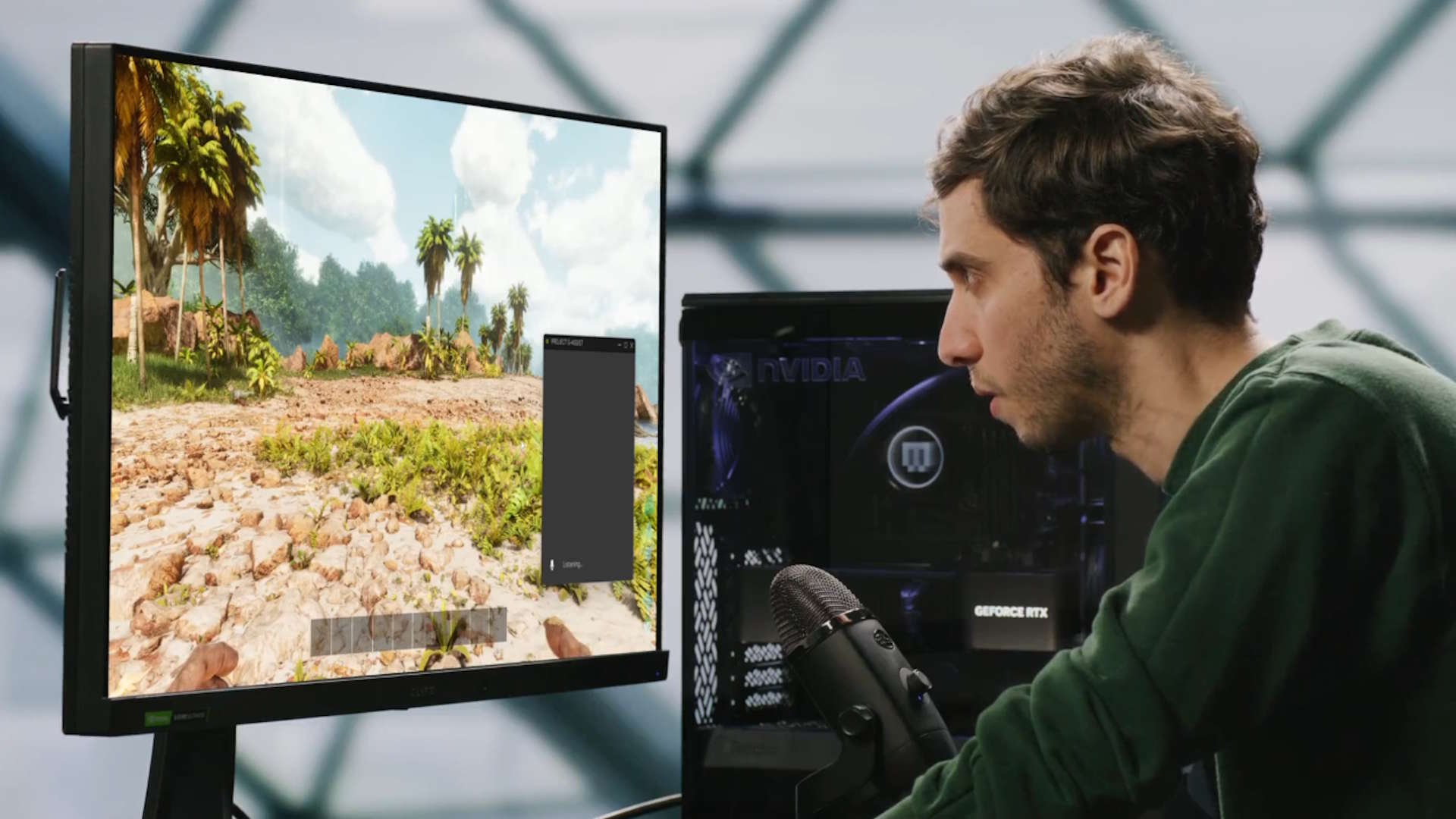
Right now it's just a Computex tech demo, but the gaming focused Project G-Assist AI might just be the most interesting AI assistant I've seen yet. And I've seen a lot, and we'll likely see a million more throughout the Taipei show this week and on through this 'year of the AI PC'.
And, by the way, you can now add 'RTX AI PC' to the list of new ways we're meant to be talking about our personal computers when they've got an Nvidia GPU inside them. Microsoft has ignored Nvidia when it's talking Copilot+, but it's not about to get left out of any 'AI PC' shizzle as the arguably the biggest hardware player in the entire field.
I'm already rather fatigued by all this AI talk, but in a pre-show briefing it was the Project G-Assist demo that really caught my eye. If the name seems familiar it's because it was the title of an April Fool's 'joke' of Nvidia's back in 2017, but this version is a lot less ridiculous. This new technology demo highlights a use case where it acts as an AI layer over the top of any game you're playing, allowing you to ask questions and advice about the game's settings and your PC's performance.
This is all information Nvidia already has at its fingers, with its software overlay capable of presenting a ton of data on your rig's performance in real-time, as well as a host of per-PC recommendations on the optimal settings for pretty much any game you care to throw at GeForce Experience.
Except, with a potential G-Assist layer you would have instant access to all of that through a natural language interface. Old PC hands are always going to want to dig into the settings, tweak things themselves, and run their own benchmarks, etc. And that's grand, but with an AI assistant able to surface all of that detail for a new, more casual audience you're instantly opening up the intricacies of PC gaming to a wider player base.
The demo showed a user asking for a graph of the game's latency over the past minute and asking for advice on how to best set up the game for their own PC. It also highlighted where you could ask for a target minimum frame rate and have G-Assist lowering the power demands for more efficient, cooler gaming. It also presented potential overclocking options and resolution settings.
And I love all that.
The biggest gaming news, reviews and hardware deals
Keep up to date with the most important stories and the best deals, as picked by the PC Gamer team.
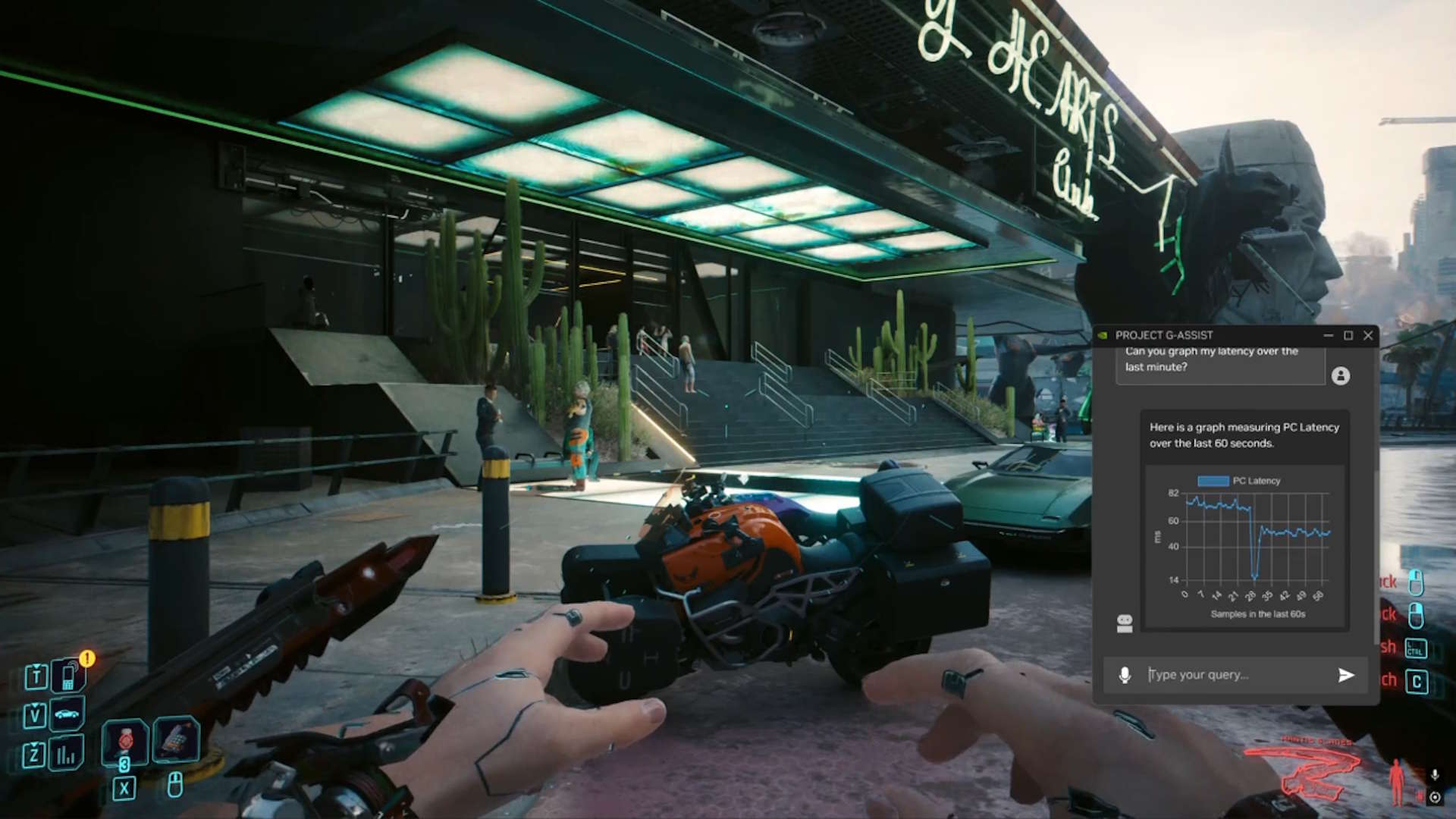
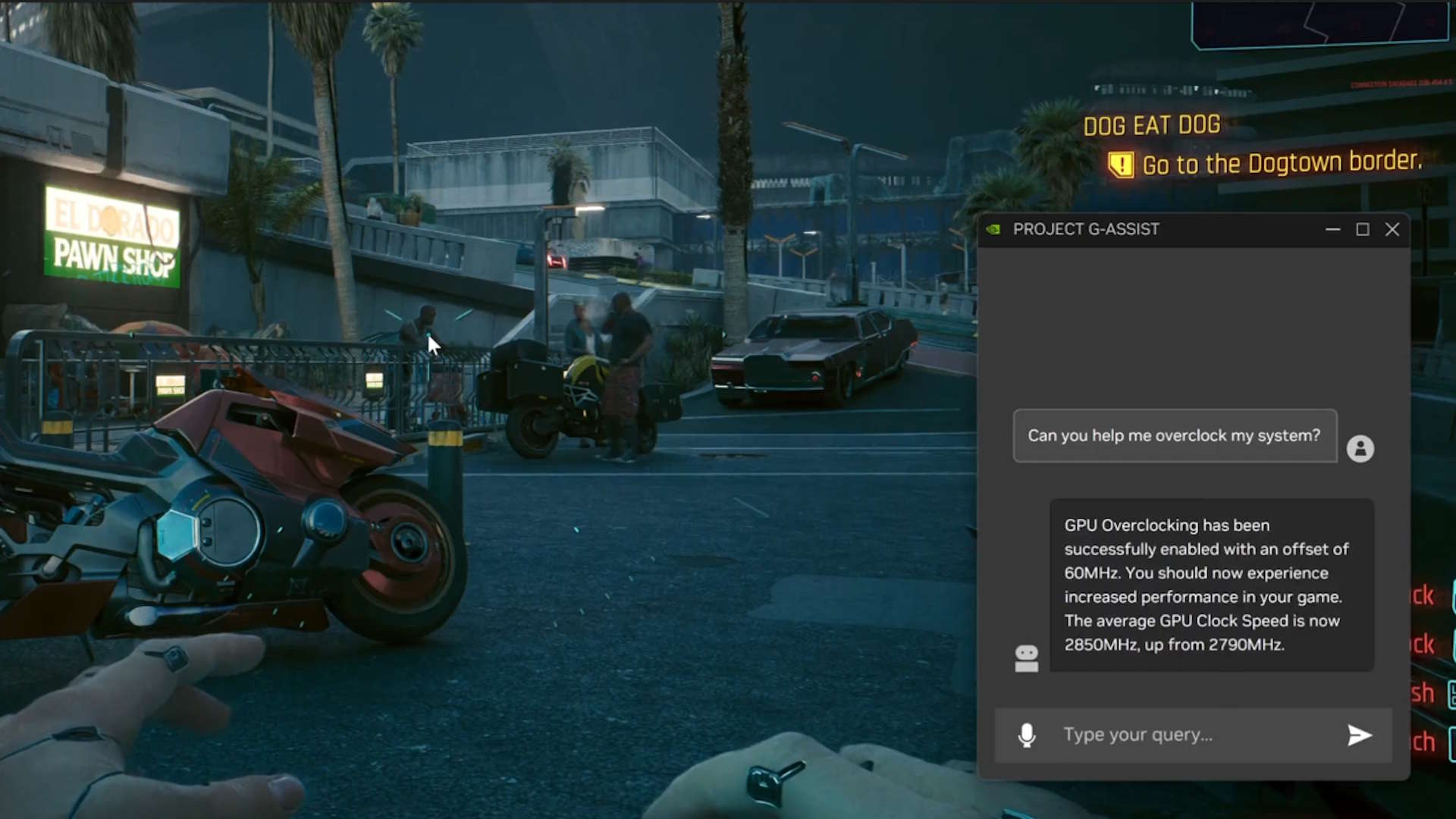
I'm a PC gaming fan boi, and I want everyone to get just as much out of the very individual nature of the hobby, where you can tailor your experience to almost exactly how you want it. But I am also aware that it can be a minefield for newcomers.
Just look at your average graphics settings screen. The sheer number of options, often with no explanation of what they mean, can be dizzying. Obviously, you've got handy folk like us to help demystify PC graphics options, but that still requires some level of research. And if you just want to get your new game running beautifully right now no-one's got time for that.
It's why I've always appreciated GeForce Experience and it's auto optimising of game settings based on Nvidia's and other users' feedback. If you've got a monster rig you can whack all the graphics settings up and feel smug, but if you need to compromise then having a starting point to build from, or just a one-touch setting to hit is incredibly useful. I've always used it on my gaming laptops, and find it super useful in those constrained environments.
So all that data is already available, and with the proposed Project G-Assist AI it's accessible without having to do anything other than just ask for it.
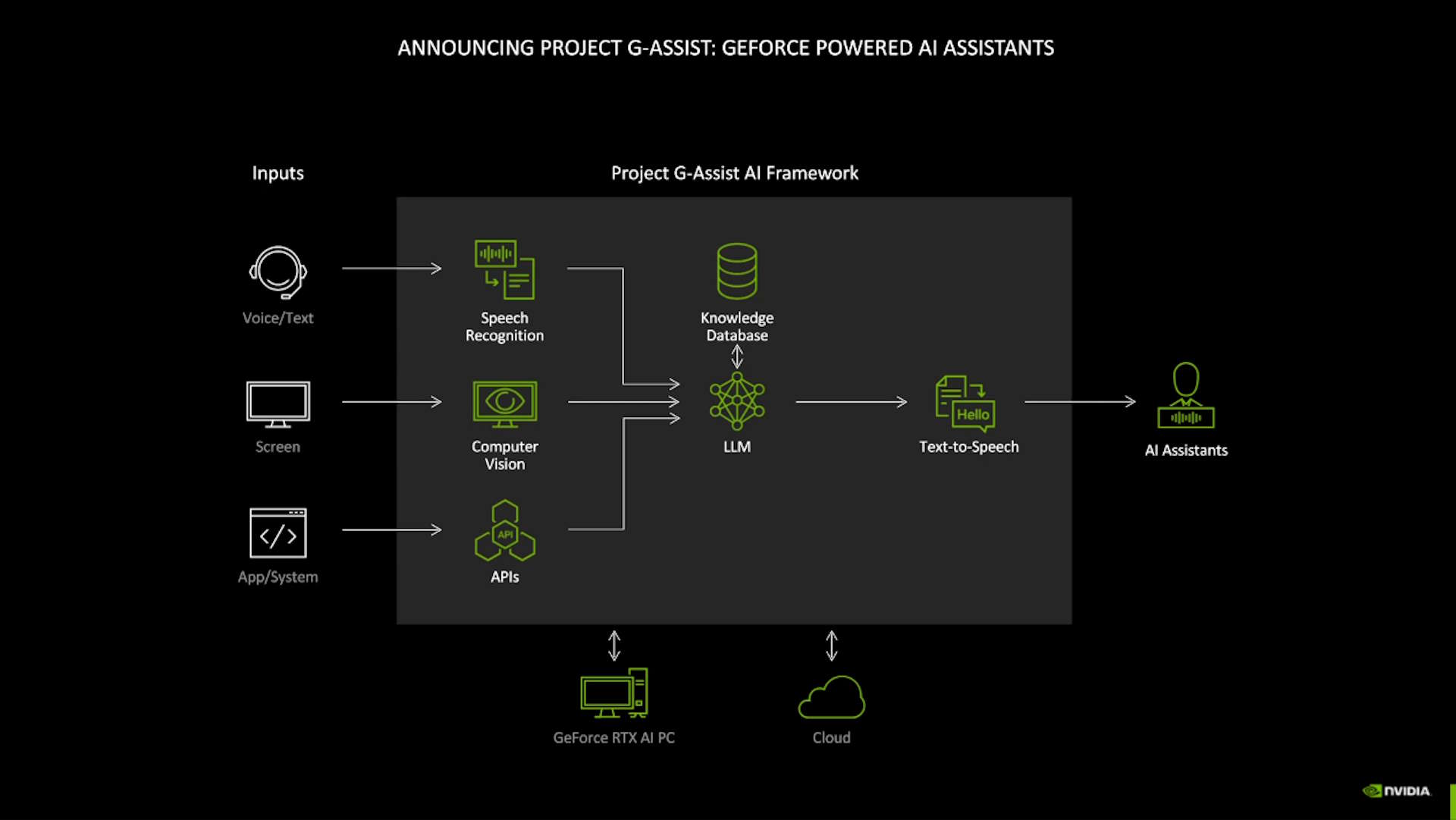
My antipathy towards AI assistants has recently all been about its lack of actual usefulness or accuracy. Large language models (LLMs) are built on large pools of data but pick what to present back to you based on probability. In my experience, that has made them vague at best, and outright liars at worst.
But Project G-Assist theoretically has all the definite answers to draw from to deliver the right information, and be in a position to act upon it for you.
"Think of it as kind of like an AI-powered version of our optimal settings that you find in the Nvidia App or previously GeForce Experience," an Nvidia representative tells me. "It's relying on that knowledge to apply those settings on the fly within the game. The game may need a restart depending on the settings you're changing, but it's not relying on game integration."
As a concept, I'm sold. Whether we'll see it baked into a version one of the Nvidia App once it's out of beta, however, is another thing entirely.
"AI assistants will transform the way we engage with our favourite games and apps, and Project G-Assist is a glimpse into that future," its says in the Nvidia demo. Though for now it's still just a proof of concept tech demo.
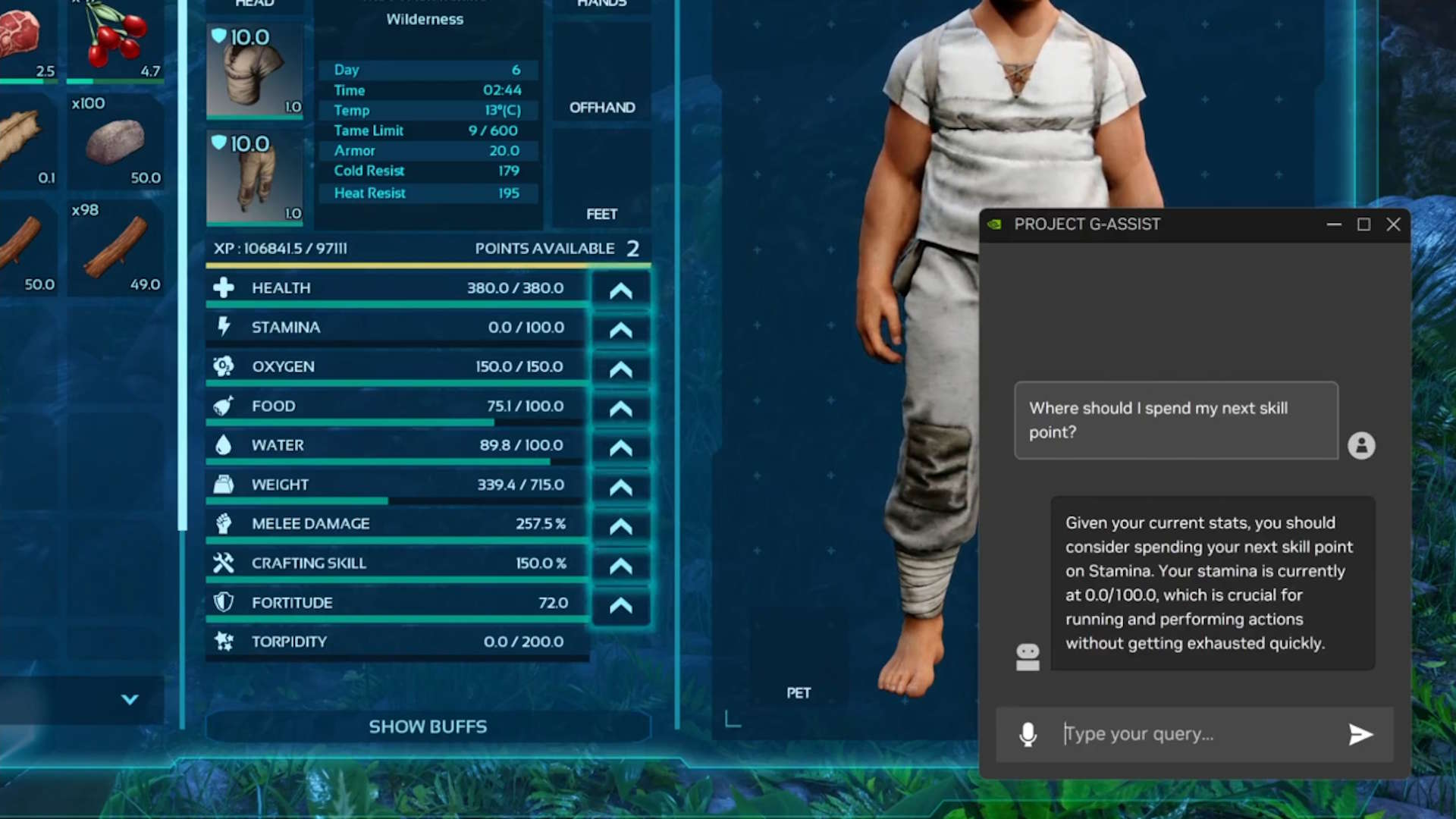
There is another side to this though, another string to the tech demo's bow, and that's as a per-game assistant. Nvidia talks about the amount of guide content out there on the internet for our favourite games, stating there are two million guides on Steam alone and hundreds of thousands of wikis. It posits the question of: What if you could just ask the devs?
Working with the creators of Ark Survival Ascended, Nvidia has integrated a "Knowledge Database" from the developer into the Project G-Assist Framework, which in turn plugs it into the same LLM you can ask about your PC's performance. This part of the demo describes a context-aware AI assistant that you can do something as simple as ask where to spend skill points given your current build, or what the best early game weapon might be.

Best CPU for gaming: The top chips from Intel and AMD.
Best gaming motherboard: The right boards.
Best graphics card: Your perfect pixel-pusher awaits.
Best SSD for gaming: Get into the game ahead of the rest.
All things you could theoretically go Google for, but presented right there as an AI overlay as you play. I can imagine I'd have asked it a lot about Elden Ring and Baldur's Gate 3 while I was playing, though whether I would have got as succinct or as interesting a set of answers as I did from my own searches is debatable. Where the PC performance assistant makes sense to me as a machine-wide thing, this part of the project doesn't sing so loudly to me. For a start it has to be a per-game thing, because it requires the devs to create a dedicated "Knowledge Database" from the get-go.
But one of the things it can't do is crowd-source knowledge from actual players. It's here only presenting the data the developers give it, so you won't get workarounds, or tricks, or builds the creators themselves didn't even know about. That's all part of the joy of getting deeper into the complex games we have today, and an AI assistant built to surface only one source of data is going to be more sterile in comparison.
I can see it being useful for basic things, but I can't see it completely replacing the player-created content so many of us rely on when we game.

Dave has been gaming since the days of Zaxxon and Lady Bug on the Colecovision, and code books for the Commodore Vic 20 (Death Race 2000!). He built his first gaming PC at the tender age of 16, and finally finished bug-fixing the Cyrix-based system around a year later. When he dropped it out of the window. He first started writing for Official PlayStation Magazine and Xbox World many decades ago, then moved onto PC Format full-time, then PC Gamer, TechRadar, and T3 among others. Now he's back, writing about the nightmarish graphics card market, CPUs with more cores than sense, gaming laptops hotter than the sun, and SSDs more capacious than a Cybertruck.

